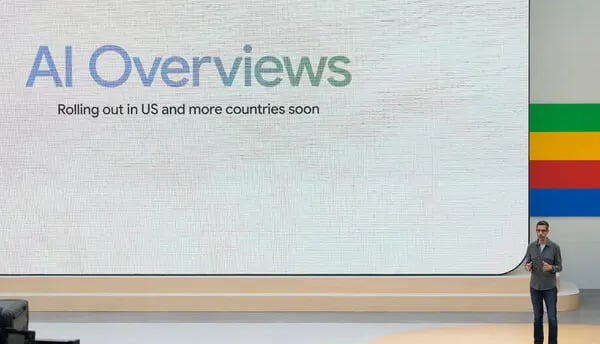Google's New AI: Enhancing Search Experience with In-Depth Answers
The SEO Bugs blog post helping you get the most out of your search engine opermisation and Google ads management service with the new roll out of Google new AI Overview.
Keith Werbisky
6/28/20244 min read


Google's New AI Overview: Transforming SEO and PPC Advertising
Welcome to The SEO Bugs blog post on AI overviews, Googles biggest announcement for a long time! Google’s latest advancements in artificial intelligence (AI) are set to revolutionise the way we approach SEO and PPC advertising. As the world's leading search engine continues to integrate AI more deeply into its algorithms, understanding these changes becomes crucial for businesses aiming to maintain and enhance their online visibility.
The Rise of AI in Google’s Platforms
Google has been a pioneer in leveraging AI to enhance user experience and improve search accuracy. The recent developments in their AI technology, particularly with the introduction of models like BERT (Bidirectional Encoder Representations from Transformers) and MUM (Multitask Unified Model), have significantly advanced the understanding of natural language and user intent. These models are designed to provide more relevant and comprehensive search results, even for complex queries. For example, we will use an occasion such as an anniversary. When Googled "what should I do for my anniversary the weekend" Google would usually give you a list of sites that are ranking for this keyword. Now with AI it will give you multiple options, Places to go for a meal, types of food people go to eat on their anniversary, local restaurants serving these types of food. If you don't feel like going out it will also give you options for meals people make at home along with recipes on how to cook them.
Impact on SEO
AI's enhanced ability to understand context and semantics is reshaping SEO. Here are key ways in which these advancements are influencing SEO practices:
Content Quality and Relevance: Google’s AI prioritises high-quality, relevant content. It’s no longer just about keyword stuffing; the focus is on creating content that genuinely answers users’ queries. This means a deeper understanding of user intent and producing comprehensive, authoritative content is more critical than ever.
User Experience (UX): AI evaluates various aspects of user experience, including page load speed, mobile-friendliness, and interactivity. Websites that offer a seamless user experience are more likely to rank higher. Therefore, SEO strategies must now include UX optimisation to meet AI's criteria.
Semantic Search: With AI's improved understanding of context, SEO now involves optimising for semantic search. This means using related keywords, synonyms, and natural language phrases to align with how people actually speak and search.
Local SEO: AI advancements have also refined local search results. Businesses must ensure their local SEO is robust, with accurate and consistent information across online directories and a strong presence in local searches.
PPC Advertising in the AI Era
AI is not only transforming organic search but also how PPC (Pay-Per-Click) advertising operates. Here’s how AI is enhancing PPC campaigns:
Automated Bidding: Google’s AI-driven automated bidding strategies help advertisers maximise their budget by predicting the likelihood of conversions and adjusting bids in real-time. This ensures that ad spend is optimised for the best possible outcomes.
Enhanced Targeting: AI enables more precise audience targeting. By analysing vast amounts of data, it can identify and target potential customers with a higher degree of accuracy. This means PPC ads are more likely to reach the right audience at the right time.
Ad Personalisation: AI facilitates dynamic ad creation and personalisation. Advertisers can create ads that adapt to individual user preferences and behaviours, resulting in more engaging and effective ad experiences.
Performance Insights: AI-powered analytics provide deeper insights into campaign performance. Marketers can access detailed reports that highlight what’s working and what isn’t, allowing for continuous optimisation and improved ROI.
The Synergy of SEO and PPC in the era of AI overviews
The integration of AI into both SEO and PPC creates a synergistic effect. SEO benefits from AI’s ability to improve content relevance and user experience, while PPC gains from AI’s precision in targeting and bidding. Together, these advancements lead to more efficient and effective digital marketing strategies.
Google have also mentioned they are wanting to change how people shop online, not only will you be able to type a product in and get a list of pictures and prices but it is implementing 3D images. So how will this work? Lets say we create an add for a pair of trainers, the user now will be able to rotate the trainer seeing how they look from the top, side back or even the sole of the shoe. Lets say we are wanting to by a new top, now Google is wanting to implement the ability to change the size of the picture to be more like the size of the person actually purchasing the item, this is giving them a more realistic perspective on how their new items will look.
For businesses, staying ahead in this AI-driven environment means embracing these technologies and adapting their SEO and PPC strategies accordingly. The focus should be on creating high-quality content, optimising for user experience, leveraging AI-powered tools for campaign management, and continuously analysing performance data to refine approaches.
Conclusion
Google’s new AI advancements are not just incremental updates; they are transformative changes that will shape the future of digital marketing. By understanding and harnessing these technologies, businesses can enhance their SEO and PPC efforts, ensuring they stay competitive in an increasingly AI-driven digital landscape. As we move forward, the key to success will be staying informed, agile, and innovative in leveraging AI to meet and exceed user expectations. Why not try our free audit option here and see if your website is ready for these upcoming changes.
